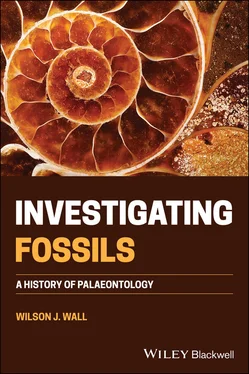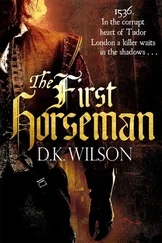De La Beche, Henry Thomas(1796–1855).Born in London, he was brought up by his mother in Lyme Regis on the early death of his father. He was a friend of Mary Anning and an avid collector of fossils. He joined the Geological Society, being President in the season 1848/1849. In 1835 he was appointed director of the Geological Survey of Great Britain. He was elected FRS in 1819 and knighted in 1848. He founded the Geological Museum and the Royal School of Mines.
de Maillet, Benoit(1656–1738).de Maillet was born into a noble family of Catholics where he received a classical education, although he did not attend university. He travelled widely during his life which allowed him to indulge his interest in geology and natural history. His career was as a diplomat, being French Consul General in Cairo where he studied the Pyramids, then went to Tuscanny and finally in 1715 to the Levant, that ill‐defined area of the east Mediterranean as far as Syria. From 1722 he produced manuscripts which would result in his seminal work Telliamed, his name spelt backwards. This was published in 1748, after his death.
Democritus(c. 460–370 BCE).Born in Abdera in Thrace, he was a prolific author on many different subjects, although the only known works that survived were fragments on ethics. He developed the atomistic theory of Leucippus and was a considerable influence on his contemporaries. Karl Marx chose Democritus as the subject for his PhD thesis.
Descartes, Rene(1596–1650).He was born in a small town near Tours, his home town now taking the name Haye‐Descartes. He was educated at a Jesuit College between 1604 and 1614. With enough of an inheritance to make him independent, he spent his life travelling. He was a serving soldier in Holland and Hungary for many years, leaving in 1621 and later settled in Holland for 20 years. He was persuaded to become tutor to Queen Christina of Sweden, but within five months he had contracted a lung complaint and died.
Disraeli, Benjamin(1804–1881).Born in London and educated privately, he was articled to a solicitor. His first novel was published 1826. In 1837 he became MP for Maidstone. While he was an active member of parliament, he continued his writing. He was Chancellor of the Exchequer before becoming Premier. He was married to the widow of another MP, Wyndham Lewis.
Doyle, Arthur Conan(1859–1930).Born in Edinburgh, he was educated in Edinburgh and in Germany. He studied medicine at Edinburgh and then started a practice in Southsea. He then went to London as an oculist. Both of these activities were financially unsuccessful. It was this which coaxed him to write. His initial Sherlock Holmes stories were serialised in Strand Magazine from 1891 to 1893. He was knighted in 1902. He was married twice having five children, two with his first wife and three with his second.
Drake, Frank(1930–).Born in Chicago, he went to Cornell University on a Navy Reserve Officer Training Corps scholarship, where he studied astronomy. On graduating he was briefly at sea as an electronics officer. He then went to Harvard to study radio astronomy. His first wife was Elizabeth Bell, with whom he had three sons and with his second wife Amahl, two daughters.
Dubois, Marie Eugene Francois Thomas(1858–1940).Born and raised im Limbourg, he studied medicine at the University of Amsterdam and taught anatomy at the art schools. To search for human remains he joined the Dutch East Indian Army as a surgeon to get to Java. He married and they had one daughter. In 1897 he was appointed professor of geology at the university.
Durer, Albrecht(1471–1528).Born in Nuremburg, the son of a Hungarian goldsmith, he was apprenticed to the chief illustrator of the Nürnberg Chronicle where he worked until 1490. During the next few years he travelled widely and also married, this presaged a great period of creativity. Although renowned as a great painter, his engravings demonstrate a great sensitivity to the material that he is using and the possibilities and limitations of the technique. He can be seen as the inventor of etching as many of his engravings have lines enhanced by acid corrosion.
Efremov, Ivan.See
Yefremov Empedocles(c. 494–434 BCE).A native of Sicily, little is known of his life. He was born into a wealthy family and became an extremely accomplished orator. We know that a biography of him was written by Xanthus, but that is all that we know about it because it was lost in antiquity.
Epicurus(341–270 BCE).Epicurus was born on the Greek island of Samos. His school was well known for eating simple meals and encouraging women members of the school. Although thought to have written a vast amount of material, very little has survived, some letters intact and some fragments. Most of his work is known from later writers reporting on his life. His philosophical ideas all but disappeared throughout the middle ages, finding a revival of interest in the twentieth century.
Eratosthenes(c.276–194 BCE).Eratosthenes was a Greek mathematician and astronomer born in Cyrene. He was in charge of the library at Alexandria and regarded as the greatest polymath of his time. Besides calculating the circumference of the earth, he wrote on geography and literary criticism. Only fragments of his work remain, secondary sources providing most of the information regarding his accomplishments.
Figuier, Louis(1819–1894).Born in Montpelier, Figuier trained in medicine and became professor at L'Ecole de Pharmacie of Paris. He wrote extensively on matters scientific and held some extreme views. His wife was a writer of novels.
Fitzroy, Robert(1805–1865).Born at Ampton Hall in Suffolk. At the age of 12, he entered the Royal Naval College and a year later, he joined the Royal Navy. He commanded the Beagle on its five‐year voyage with Darwin. Not long after arriving back in 1836, Fitzroy married Mary Henrietta O'Brien, they had four children. After the death of Mary, Fitzroy married Maria Smyth in 1854 and had one daughter. He became Member of Parliament (Tory) for Durham in 1841.
Galilei, Galileo(1564–1642).Born in Pisa, as the son of a musician, he studied music before mathematics and physics. At 25, he was professor of mathematics at Pisa. After he had moved to Padua, Marina Gamba moved in with him. Although they never married, there were three children. He came into direct conflict with the Papacy and at the age of 69 was sentenced to house arrest. His life was filled with mathematical and scientific accomplishments for which he is justifiably remembered.
Gesner, Conrad(1516–1565).Born in poverty in Zürich, Switzerland, he was sponsored to study theology and languages in France and medicine in Basel, later to become city physician in Zürich. His interests were wide and he is often considered a true polymath, writing on scientific matters as well as languages and bibliography.
Gillray, James(1757–1815).Gillray was born in Chelsea, a trooper's son. It was in about 1784 that he became known as an engraver. His work contained many satirical ideas, for which he became justly famous. For the last four years of his life he was judged to be insane.
Goldschmidt, Richard(1878–1958).Gldschmidt was born in Frankfurt and educated in the classical tradition, gaining a place at Heidelberg University, studying anatomy and zoology. He moved to University of Munich to study nematode histology but became interested in genetics. In 1909 he became professor at Munich and studied sex determination. In 1914 he was stranded in Japan with the outbreak of WWI. Travelling to the USA he was interred, returning to Germany in 1918. As the political situation worsened, he realised it was no longer safe for him in Germany, so in 1936 he moved to the USA becoming professor at Berkley, University of California.
Читать дальше












